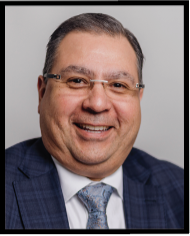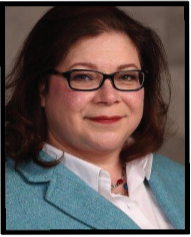Experienced Elected Leaders Share Insights From Their Years in Local Government
As this year’s incoming newly elected officials assume their roles, Jorge Prince and Lisa Dircks share wisdom from their combined nearly 16 years of government service.
By Deborah Lynn Blumberg

JORGE PRINCE
The driving force behind Jorge Prince’s campaign for mayor of Bemidji was a desire to restore industry to the city he grew up in. Prince, a first-generation Mexican immigrant, finance professional, and small business owner, has been mayor since 2020. He’s focused on rebuilding relationships with tribal neighbors, building up business, and leading major infrastructure projects.
QUESTION: What inspired you to run for mayor? Jorge Prince: I moved to Bemidji in 1976, and growing up realized the city was having structural problems. Our county is one of the poorest in the state. Lumber mills closed, the first batch in the ‘80s, more in the ‘90s, and that impacted us pretty negatively. It was our industrial base; we never really replaced it. As a student at Bemidji State, then as a young professional, I kept hoping somebody would take these challenges head on. Finally, in 2014, I thought, maybe that person is me, so I ran for mayor. I lost that campaign by a couple hundred votes and wasn’t so sure I’d ever run again. Then in 2020, a seat became open and people asked, ‘Are you going to run?’ My kids were grown, so I thought, let’s try. Now, I’m also a business partner in seven companies, and proud to be part of efforts to bring industry back to Bemidji.
Q: What’s been the biggest challenge you’ve encountered while in office? JP: Navigating complex issues in a polarized world. The majority of city issues are not political, from streets to water to policing. But because we live in a polarized world, people look at things through lenses. It’s surprising how that percolates into local affairs. I try to approach things through a lens of, just because we’re on the opposite side of something today doesn’t mean we have to be on the opposite side of everything forever.
Q: What do you wish you had known going in that you know now? JP: I always knew government moves slowly, but it moves even slower than I thought. People automatically think that’s a bad thing. But when you’re talking about bringing change, you have an obligation to help steward your entire community through change, and people generally don’t want to see it happen fast. So, just know that, if you want to bring change, it’s going to take you even longer than you would have thought.
Q: How can incoming elected officials prepare for their new role? JP: This role is all about relationships — that’s key to being a successful local leader. The more you can develop relationships before you take office, and once in office, the better it’s going to be. Get out of your comfort zone and meet people you otherwise wouldn’t, and don’t go in with an agenda. Be there, participate, build a relationship. The more you build in a variety of spaces in your community, the easier it is down the road when difficult decisions need to be made. I don’t typically go to symphony events, but I get invited, go, and learn from those people. It’s the same with the racetrack. I’ve been in so many neat spaces in our community I didn’t even know existed.
Q: What are some resources you’ve relied on? JP: The League of Minnesota Cities has tremendous resources. I immersed myself in the League’s new elected official training, the Elected Leaders Institute (ELI) Foundational Program, and I also went to the ELI Advanced Program. Through those I was able to build relationships with council members in other places, as well. I found that community of fellow elected officials to be invaluable.
Q: What’s been a bright spot or highlight so far in your time as mayor? JP: To rebuild relationships with our tribal neighbors, we had council-to-council meetings with all three nations. It was the first time that had been done in our city’s 125 years. We’ve also worked on big infrastructure projects that we secured millions for, including building new facilities that filter per- and polyfluoroalkyl substances (PFAS) out of our wells.
Q: Any parting words of advice for incoming officials? JP: Be consistent. When people say things that aren’t truthful, remain professional, stay on point about what you did. It’s what your citizens need from you. Also, remember you’re responsible for representing everybody, then give yourself a little grace as a newly elected official. You’re not always going to get it right; you may be wrong and make a decision you’ll regret. The goal is to learn and do the best you can.
LISA DIRCKS

In the City of Spring Lake Park, Lisa Dircks worked in civil engineering designing roadways before joining her city’s planning board commission, a role she held for five years, one as chair. Running for City Council felt like a natural progression. Dircks was appointed in 2019 and reelected in 2020. She’s been instrumental in updating city codes and navigating a changing demographic of aging residents, coupled with a change in the city’s economic demographic and a younger, more diverse population.
QUESTION: What inspired you to run for council originally? Lisa Dircks: I was a 10-year plus volunteer with the nonprofit Fare for All, which provides lower-cost fresh food for people across Minnesota and Wisconsin. As a single mom, I benefited from the program. When the site I was working on moved elsewhere, I saw a volunteer opening on the Spring Lake Park Planning Commission and applied. I’d worked in civil engineering and surveying technology, so this complemented my career. Being on the commission gave me insight into how government functions — the biggest project I worked on was rewriting our zoning code. Several years later there was a Council opening; it felt like a natural progression. I wasn’t sure I wanted to be on the City Council, but the appointment gave me an opportunity to try the position out. I grew up very poor, and there’s a feeling that comes with that background that you don’t belong in positions of influence and your voice might go unheard. I figured if I did win, but it wasn’t the right fit, I didn’t have to run again. When I ran for election a year later, I did it to make an impact for people who don’t believe they have a voice.
Q: What do you wish you had known going in that you know now? LD: I wish I’d known more about how government accounting works. I spent a while reading the entire city budget. That was the hard part for me, the financial bit. On the human side, it’s getting used to the fact that often by the time residents call you they already have a problem and they’re very upset. I can still remember the few first nasty emails I got. You have to be able to get that person to the point that they can be calm so you can actually help them with their issue.
Q: What are some important skills elected officials should possess in order to be successful? LD: Being a council member is really all about relationships, networking, and listening. Brush up on your listening skills, have that natural curiosity, network with other elected officials, and ask questions, particularly of your staff. Building relationships with my city administration was very helpful. Your staff are your allies, they do the job every day and know how it works. To help with relationship-building, I volunteer at city events. It allows me to meet people I wouldn’t necessarily meet, and for them to meet me. It’s important because many people don’t know who their mayor or City Council members are, and it’s easier to reach out to people you know. This helps foster engagement and makes government accessible to our residents. We recently tried something new, a Pokémon Go Community Day event — a city police officer and I play Pokémon — and we got 60 people to attend, which was huge. It showed us that when you want to engage people, you’ve got to figure out what their passion is, go where they are, or give them a reason to come to you. You have to get creative in how you engage.
Q: What are some resources you recommend to hone those skills? LD: For my day job, I work for the Minnesota Department of Transportation, and if they’re offering any kind of communications class I sign up. I also listen to audiobooks while commuting, books on how to communicate, how to listen, and how the history of politics has made government inaccessible and difficult to engage with. Learn as much as you can as often as you can because nobody knows this job 100%. You just have to keep learning and adjusting.
Q: What inspired you to seek reelection? LD: I considered not running again because of family health issues, because it’s a big commitment, and I didn’t want to run if I couldn’t do my best. In the end, I realized that I really like doing this work, and I’m excited about guiding my city into the future.
Q: Any parting words of advice for incoming officials? LD: Read your city code. It took me three months on the bus, reading it on a tablet, but now I have a good idea of how things are set up and how they work. Also, treat city staff with respect. They do the day-to-day work of running the city, and they deserve to be treated like the professionals that they are. A little bit of respect and support goes a long way with your staff, other elected officials, and the community you represent.
Deborah Lynn Blumberg is a freelance writer.

